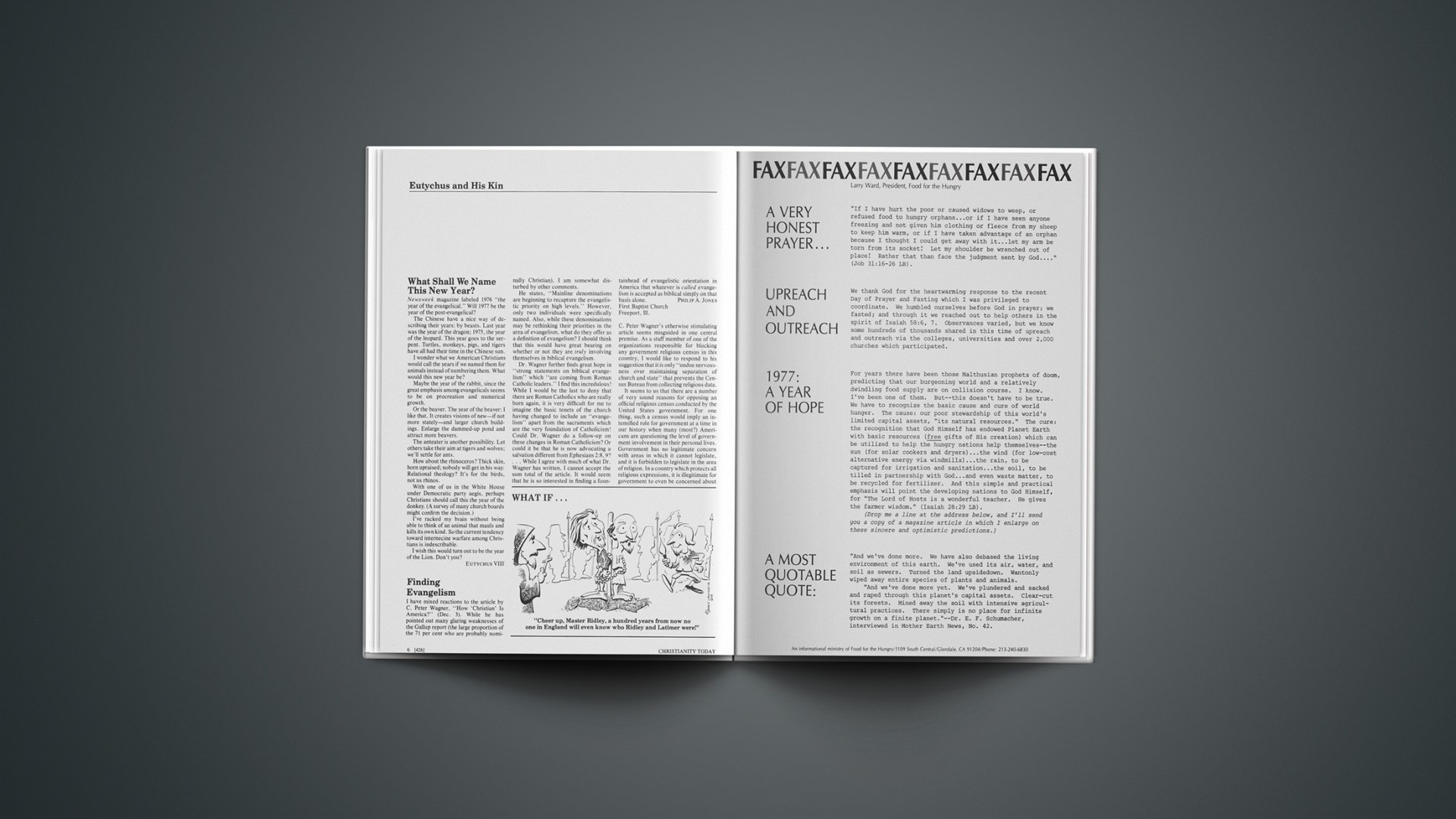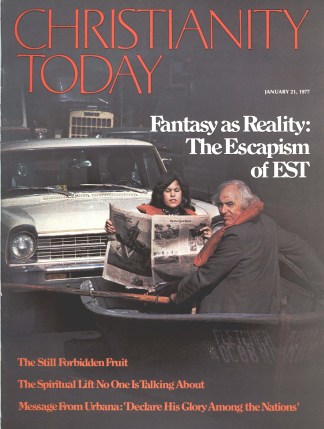What Shall We Name This New Year?
Newsweek magazine labeled 1976 “the year of the evangelical.” Will 1977 be the year of the post-evangelical?
The Chinese have a nice way of describing their years: by beasts. Last year was the year of the dragon; 1975, the year of the leopard. This year goes to the serpent. Turtles, monkeys, pigs, and tigers have all had their time in the Chinese sun.
I wonder what we American Christians would call the years if we named them for animals instead of numbering them. What would this new year be?
Maybe the year of the rabbit, since the great emphasis among evangelicals seems to be on procreation and numerical growth.
Or the beaver. The year of the beaver: I like that. It creates visions of new—if not more stately—and larger church buildings. Enlarge the dammed-up pond and attract more beavers.
The anteater is another possibility. Let others take their aim at tigers and wolves; we’ll settle for ants.
How about the rhinoceros? Thick skin, horn upraised; nobody will get in his way. Relational theology? It’s for the birds, not us rhinos.
With one of us in the White House under Democratic party aegis, perhaps Christians should call this the year of the donkey. (A survey of many church boards might confirm the decision.)
I’ve racked my brain without being able to think of an animal that mauls and kills its own kind. So the current tendency toward internecine warfare among Christians is indescribable.
I wish this would turn out to be the year of the Lion. Don’t you?
EUTYCHUS VIII
Finding Evangelism
I have mixed reactions to the article by C. Peter Wagner, “How ‘Christian’ Is America?” (Dec. 3). While he has pointed out many glaring weaknesses of the Gallup report (the large proportion of the 71 per cent who are probably nominally Christian), I am somewhat disturbed by other comments.
He states, “Mainline denominations are beginning to recapture the evangelistic priority on high levels.” However, only two individuals were specifically named. Also, while these denominations may be rethinking their priorities in the area of evangelism, what do they offer as a definition of evangelism? I should think that this would have great bearing on whether or not they are truly involving themselves in biblical evangelism.
Dr. Wagner further finds great hope in “strong statements on biblical evangelism” which “are coming from Roman Catholic leaders.” I find this incredulous! While I would be the last to deny that there are Roman Catholics who are really born again, it is very difficult for me to imagine the basic tenets of the church having changed to include an “evangelism” apart from the sacraments which are the very foundation of Catholicism! Could Dr. Wagner do a follow-up on these changes in Roman Catholicism? Or could it be that he is now advocating a salvation different from Ephesians 2:8, 9?… While I agree with much of what Dr. Wagner has written, I cannot accept the sum total of the article. It would seem that he is so interested in finding a fountainhead of evangelistic orientation in America that whatever is called evangelism is accepted as biblical simply on that basis alone.
PHILIP A. JONES
First Baptist Church
Freeport, Ill.
C. Peter Wagner’s otherwise stimulating article seems misguided in one central premise. As a staff member of one of the organizations responsible for blocking any government religious census in this country, I would like to respond to his suggestion that it is only “undue nervousness over maintaining separation of church and state” that prevents the Census Bureau from collecting religious data.
It seems to us that there are a number of very sound reasons for opposing an official religious census conducted by the United States government. For one thing, such a census would imply an intensified role for government at a time in our history when many (most?) Americans are questioning the level of government involvement in their personal lives. Government has no legitimate concern with areas in which it cannot legislate, and it is forbidden to legislate in the area of religion. In a country which protects all religious expressions, it is illegitimate for government to even be concerned about the degree of religious belief, affiliation, or practice that such a census would inevitably involve.… Since churches and church research groups can do the job reasonably well, it is not appropriate for the government to gather data for the primary use of churches. Such an undertaking would surely violate the “principal or primary effect test,” upon which many church-state legal decisions are decided.
Finally, we question whether any census in any country could really uncover the number of individuals who “practice the Christian code in their daily lives.” This type of data would elude the most sophisticated government data-gathering agencies, or even public-opinion surveys. We believe the churches and synagogues of America are quite capable of gathering adequate statistical and quantitative information to help them in their work. Let’s not call upon the government for everything.
ALBERT J. MENENDEZ
Director of Research
Americans United for Separation of Church and State
Silver Spring, Md.
Who Pays For “No Need”?
I do not wish to detract from the very fine article by Leon Gerig, “Financing for the Future” (Nov. 5). On the other hand, I do feel that the article contains one inference which your readers should examine and consider very carefully. The list of possibilities offered to parents who wish to receive financial assistance for students planning to attend college is very inclusive and will be a great help to many people. Those people should consider, however, the moral implications of applying for or using “no need” scholarships. By asking for this sort of consideration, parents are indicating that they wish to be considered on a set of standards which differs from those used for the great majority of financial-aid applicants. They should bear in mind, also, that the cost of providing such scholarships must be borne by someone. The someone may be other students in the same college or, particularly in the case of Christian colleges, it may be an underpaid faculty. Within the financial-aid officer’s profession, there is probably not a clear consensus on the ethical nature of “no-need” scholarships. Many people will be inclined to accept such awards if they are extended. I would hope that your readers would be among the group who would consider saying no to such offers and pointing out to colleges why they cannot accept them.
JOHN H. LETARTE
Dean of Student Admissions and Records
The State University at Potsdam
Potsdam, N. Y.










